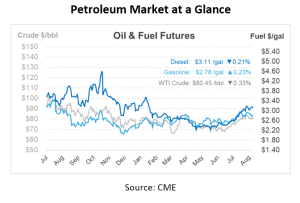
California Approves Renewable Rulemaking for Off-Road Diesel-Fueled Fleets
California has announced its final regulation amendments on requirements for off-road fleets, as the Golden State takes a determined stance to decrease harmful emissions and go green. The ruling, focused primarily on tackling greenhouse gas (GHG) emissions, has been approved by The Office of Administrative Law (OAL) and filed with the Secretary of State as of August 18, 2023. As a follow-up to our previous article on this mandate back in April, today we’ll explore the details of these finalized amendments to the existing regulation and their implications for off-road fleets.
What’s Been Finalized
One of the core objectives for updating the In-Use Off-Road Diesel-Fueled Fleets Regulation is to reduce nitrogen-oxides (NOx) and particulate matter (PM) emissions from off-road diesel vehicles. To achieve this, fleets will need to retire older models and shift towards more environmentally friendly options. The regulation dictates specific phase-outs based on engine tiers and model years, with timelines set differently for large, medium, and small fleets. The rule also brings forth specifics on which vehicles are subject to this regulation and which ones are exempted, ensuring clarity and minimizing ambiguity. Depending on fleet size, different requirements come into play:
- For large and medium fleets, starting from January 1, 2024, adding vehicles with Tier 3 or Tier 4 interim engines will be prohibited. Fleets will need to incorporate vehicles with Tier 4 final engines or higher.
- Small fleets will face a phased approach. By January 1, 2024, they won’t be able to add vehicles with a Tier 3 engine. They must move to Tier 4 interim or higher. However, by January 1, 2028, Tier 4 interim engines will also be excluded, necessitating a switch to Tier 4 final engines or better.
Due to the strong focus on reducing greenhouse gas emissions beyond carbon dioxide (CO2), starting January 1, 2024, fleets under this regulation will be required to purchase R99 or R100 renewable diesel for their operations in California. A blend of R80/B20, which was previously under consideration, did not make the cut for off-road fleets due to concerns over NOx emissions. Fleets renting vehicles will also need to ensure compliance with renewable diesel stipulations in their rental contracts.
If you are interested in reading all the final regulations set forth in the amendments, click here.
Exemptions to the Regulations
The final regulations contain several exemptions and exclusions. The regulation does not apply to a broad range of vehicles and equipment, including locomotives, commercial marine vessels, marine engines, recreational off-highway vehicles, combat and tactical support equipment, stationary equipment, and specific portable engines. Equipment or vehicles exclusively used in agricultural operations, implements of husbandry, and certain equipment governed by the Truck and Bus Regulation, the Fleet Rule for Public Agencies and Utilities, as well as the Regulation for Mobile Cargo Handling equipment at Ports and Intermodal Rail Yards, are all outside the scope of this rule. Furthermore, off-road diesel vehicles owned and operated by individuals for personal, non-commercial, and non-governmental uses are not affected.
Apart from the above exclusions, fleets composed entirely of Tier 4 Final engines, Model Year (MY) 2010 or newer on-road engines, Zero Emission Vehicles (ZEVs), and those operating in captive attainment regions have been granted renewable diesel exemptions. There’s also a provision for cold weather: fleets are permitted to use specific low-temperature diesel fuels during the winter months of November through February if they are located or operate in areas where January’s 10th percentile minimum ambient air temperature dips below 20°F. Outside of these months, the same allowance applies whenever temperatures are forecasted or observed to fall below 20°F.
Record-Keeping Requirements
Each fleet operating within the specified regulations has recordkeeping requirements concerning Renewable Diesel (RD). Each fleet must retain documents proving their compliance that clearly indicate the date and volumes of the fuel they’ve purchased. Acceptable documents for this purpose encompass fuel purchase receipts, purchase orders, or even comprehensive fueling contracts. Fleet owners are to maintain these records for a period of three calendar years from the time the fuel transaction is finalized.
On the other hand, if a fleet fails to acquire RD for its operations, they bear the responsibility of reporting this situation to the California Air Resources Board (CARB). This report should include: (1) a detailed description of the fleet’s customary refueling methods, (2) an account of the fleet’s attempts to source RD, and (3) supportive documentation that emphasizes their inability to procure RD, which could be in the form of specific communications or rejected contract bids.
The Renewable Diesel Landscape
Given the implications of this mandate on fuel consumption, it’s essential to address the market dynamics of renewable diesel. As we highlighted previously, Mansfield was awaiting clarification on specific blending options, and it has been confirmed that R80/B20 is not permissible under the current mandate.
The regulatory requirement for renewable diesel will naturally influence market demand. Mansfield anticipates sufficient RD availability by 2024 to cover the demand increase, thanks to ongoing renewable diesel projects in the U.S. Several initiatives are in the pipeline to boost domestic production, set to align with the rising focus on emissions reduction.
“As climate-conscious initiatives accelerate, we know that change can bring challenges, but we are ready to help,” said Jessica Masters, Mansfield Energy’s Director of Renewable Energy Solutions. She continued, “Mansfield has a growing suite of sustainable products, solutions, and services to support our customers in navigating factors that affect their business today and tomorrow.”

This article is part of Daily Market News & Insights
Tagged:
MARKET CONDITION REPORT - DISCLAIMER
The information contained herein is derived from sources believed to be reliable; however, this information is not guaranteed as to its accuracy or completeness. Furthermore, no responsibility is assumed for use of this material and no express or implied warranties or guarantees are made. This material and any view or comment expressed herein are provided for informational purposes only and should not be construed in any way as an inducement or recommendation to buy or sell products, commodity futures or options contracts.





